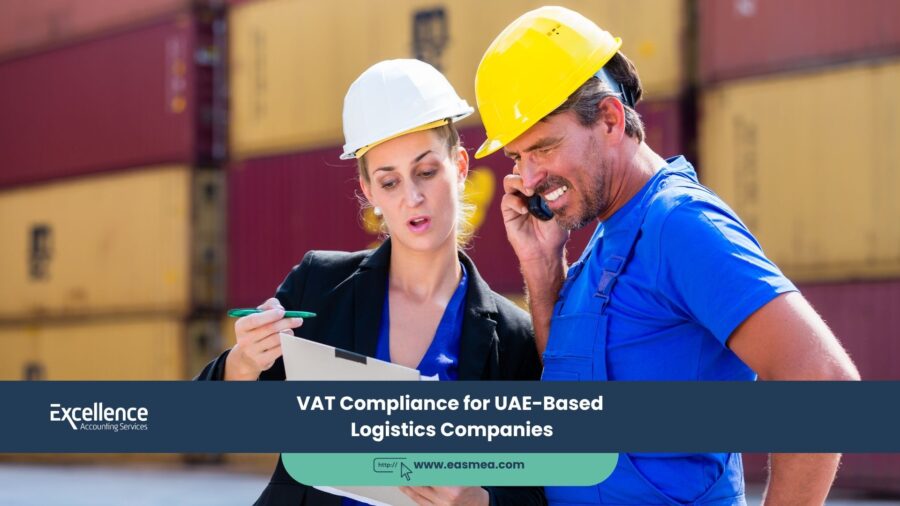VAT Compliance for UAE-Based Logistics Companies: A Complete Guide
The UAE’s strategic location has cemented its status as a premier global hub for logistics, trade, and transportation. For companies operating in this dynamic sector—from freight forwarders and shipping lines to customs brokers and warehouse operators—efficiency and precision are paramount. With the introduction of VAT, another layer of complexity was added, demanding the same level of meticulousness in financial management as in physical operations. The rules governing the logistics sector are uniquely intricate, hinging on complex “place of supply” principles that determine whether a service is taxed at 5% or 0%.
- VAT Compliance for UAE-Based Logistics Companies: A Complete Guide
- Part 1: The Core Principle - Place of Supply for Transportation
- Part 2: The VAT Treatment of Related and Ancillary Services
- Part 3: Disbursements vs. Reimbursements - A Critical Distinction
- How Excellence Accounting Services (EAS) Steers Your Logistics Business to Compliance
- Frequently Asked Questions (FAQs) for Logistics Companies
- Keep Your Business Moving in the Right Direction
An error in applying these rules can have significant consequences. Misclassifying an international transport service as domestic can lead to underpaid VAT, while incorrectly treating a domestic service as zero-rated can result in penalties from the Federal Tax Authority (FTA). This definitive guide is designed for logistics professionals in the UAE. We will navigate the critical distinction between domestic and international transport, clarify the VAT treatment of ancillary services like customs clearance and warehousing, and tackle the challenging concepts of disbursements and reimbursements. Mastering these areas is the key to ensuring robust compliance and maintaining a competitive edge.
Key Takeaways for Logistics Companies on VAT Compliance
- International Transport is Zero-Rated: The supply of transporting goods or passengers from the UAE to a place outside the UAE, or vice versa, is zero-rated (0% VAT).
- Domestic Transport is Standard-Rated: The supply of transporting goods or passengers between two points within the UAE is subject to the standard 5% VAT rate.
- Ancillary Services are Mostly Standard-Rated: Services like warehousing, customs clearance, packing, and freight forwarding fees are generally subject to 5% VAT, even if they relate to an international shipment.
- Documentation is Proof: Maintaining official transport documents (e.g., bills of lading, air waybills, customs declarations) is mandatory to justify the zero-rating of international transport services.
- Full Input Tax Recovery: Logistics companies making taxable supplies (both 0% and 5%) can recover the full input VAT on their business expenses, such as fuel, vehicle maintenance, and warehouse rent.
Part 1: The Core Principle – Place of Supply for Transportation
For the logistics sector, the most critical VAT concept is the distinction between domestic and international transportation. This determines the applicable tax rate and is the primary area of focus during an FTA audit.
A. Domestic Transportation (Standard-Rated at 5%)
This category covers any transportation service where the journey begins and ends within the borders of the UAE. It doesn’t matter what goods are being transported or who the client is; if the movement is point-to-point within the UAE, the service is subject to 5% VAT.
Examples of Domestic Transportation:
- Road freight from a warehouse in Jebel Ali to a retail outlet in Dubai Mall.
- Courier services from an office in Abu Dhabi to a client in Sharjah.
- Moving goods between two different free zones within the UAE.
- The domestic leg of an international journey if billed separately (e.g., trucking goods from Fujairah to Dubai International Airport before they are flown to London).
B. International Transportation (Zero-Rated at 0%)
This is a financially advantageous treatment designed to keep the UAE’s logistics sector globally competitive. A supply of international transportation of goods is zero-rated. This is defined as a service that transports goods from a place in the UAE to a place outside the UAE, or from a place outside the UAE to a place in the UAE.
Examples of International Transportation:
- Sea freight from the Port of Khalifa in Abu Dhabi to the Port of Shanghai.
- Air freight from Al Maktoum International Airport (DWC) to Frankfurt.
- Import shipment from a supplier in India to a warehouse in the UAE.
The Golden Rule of Documentation: To apply the zero rate, you are not just expected, but legally required, to retain official and commercial evidence that the goods have been transported internationally. This includes documents like signed air waybills, bills of lading, and customs exit/entry certificates. Without this proof, the FTA can reclassify the service as standard-rated and demand the 5% VAT.
Part 2: The VAT Treatment of Related and Ancillary Services
A common pitfall is assuming that services related to a zero-rated international shipment are also zero-rated. This is generally incorrect. The FTA considers most of these as separate supplies, each with its own VAT treatment, and most are standard-rated.
| Service | Typical VAT Treatment | Explanation & Justification |
|---|---|---|
| Warehousing / Storage | Standard-Rated (5%) | The service is provided and consumed in the UAE, regardless of the goods’ final destination. This includes temperature-controlled storage and general warehousing. |
| Customs Clearance / Brokerage | Standard-Rated (5%) | This is a professional service performed in the UAE. The fee charged by the customs broker is subject to 5% VAT. |
| Freight Forwarding / Agency Fees | Standard-Rated (5%) | The fee for arranging the transportation is a separate service from the transportation itself and is taxed at 5%. |
| Packing, Crating, and Palletizing | Standard-Rated (5%) | These are services performed within the UAE prior to shipment. |
| Transit Insurance | Standard-Rated (5%) | The service of arranging insurance is a financial service subject to 5% VAT. |
Properly separating these charges on your invoices is crucial. A single invoice for an international shipment should clearly distinguish the zero-rated freight charge from the standard-rated ancillary charges. A robust accounting review can help identify and correct any historical errors in this area.
Part 3: Disbursements vs. Reimbursements – A Critical Distinction
This is one of the most complex areas of VAT for logistics companies. It relates to costs you incur and then pass on to your client. The VAT treatment depends entirely on whether the cost is a “disbursement” or a “reimbursement.”
A. Disbursements (Outside the Scope of VAT)
A disbursement is when you pay a cost on behalf of your client, acting purely as their agent. You gain no profit from this payment. For a payment to be treated as a disbursement and thus be outside the scope of VAT, all the following strict conditions must be met:
- The client was responsible for paying the third party.
- The client knew the goods/services would be provided by a third party.
- The client authorized you to make the payment on their behalf.
- The payment is shown separately on your invoice.
- You pass on only the exact amount of the cost, with no markup.
- The goods/services paid for are in addition to your own supply.
Classic Example: Paying UAE customs duties on behalf of an importer. The duty is a liability of the importer, and you are merely facilitating the payment. You can recharge the exact amount of the duty to your client with no VAT.
B. Reimbursements (Subject to VAT)
A reimbursement is when you recharge a cost that was an input to your own business and part of your overall service. You are the recipient of the supply, and you are simply passing the cost on. Such recharges are considered part of the value of your supply and are subject to VAT.
Classic Example: Recharging fuel costs incurred during a domestic trucking job. The fuel was a cost to your business to perform the service. When you recharge it to the client, you must add 5% VAT, even if you recharge it at cost.
The distinction is subtle but critical. Incorrectly treating a reimbursement as a disbursement is a common reason for FTA penalties. Meticulous account reconciliation services are essential to track these pass-through costs correctly.
Modernizing Your Logistics Accounting
Tracking different service lines, managing disbursements, and retaining transport documentation is a massive administrative burden. A modern, cloud-based accounting platform like Zoho Books is a necessity. It can be configured to handle different tax rates for different services, track reimbursable expenses, and digitally store copies of shipping documents alongside the relevant invoices, creating a clear audit trail for the FTA.
How Excellence Accounting Services (EAS) Steers Your Logistics Business to Compliance
The logistics sector’s VAT rules are some of the most complex. EAS provides specialized guidance to ensure you navigate them correctly, minimizing risk and maximizing efficiency.
- Logistics VAT Advisory: Our VAT consultants provide definitive advice on place of supply rules, helping you correctly classify every service as domestic or international.
- Disbursement and Reimbursement Structuring: We review your processes and contracts to ensure that pass-through costs are structured and documented correctly to meet the FTA’s strict criteria for disbursements.
- Record-Keeping and Audit Support: We help you implement robust record-keeping systems and represent you during FTA audits, ensuring your documentation for international transport stands up to scrutiny.
- Comprehensive Bookkeeping for Logistics: Our accounting and bookkeeping services are designed to handle the unique needs of the logistics sector, from tracking fuel costs to managing customs payments.
- CFO and Business Strategy: Beyond tax, our CFO services provide strategic financial oversight to help your logistics company manage cash flow, optimize pricing, and grow profitably.
Frequently Asked Questions (FAQs) for Logistics Companies
Yes, fuel purchased in the UAE is subject to 5% VAT. Since you use the trucks to make taxable supplies (both domestic and international transport), you are entitled to recover 100% of this input VAT on your tax return.
This is considered a domestic transport service. Even though it is going to a Free Zone, the journey is between two points within the UAE. Therefore, the transport service is subject to 5% VAT.
Demurrage and detention charges are generally considered payment for an additional supply of services (e.g., extended use of a container or port facilities). As such, they are subject to 5% VAT if the service is deemed to be supplied in the UAE.
Yes. Since the journey starts in the UAE and ends outside the UAE, the entire transportation service qualifies as international transport and is zero-rated, provided you have the necessary export documentation.
Fines and penalties are generally outside the scope of VAT. If you pay a fine on behalf of your client and recharge the exact amount, it can be treated as a disbursement, provided all other conditions are met (e.g., you were authorized to pay it).
A carrier physically transports the goods; their supply is the transportation itself (zero-rated if international). A freight forwarder acts as an agent or principal to arrange transportation. Their *fee* for this arrangement service is standard-rated at 5%. If they also contract the international freight, that component of their charge can be zero-rated.
Yes. Domestic courier services are subject to 5% VAT. International courier services are zero-rated. The ancillary services like packaging provided by the courier company would be standard-rated.
The invoice must clearly unbundle these charges. The international freight portion should be shown with 0% VAT, and the customs clearance fee should be shown with 5% VAT. Combining them under a single, zero-rated line item is incorrect and could lead to penalties.
The supply of goods within a bonded zone (or “designated zone”) can be complex and may be outside the scope of VAT under certain conditions. However, the *service* of providing storage or warehousing is generally standard-rated at 5%, as the service is performed in the UAE.
The profits of your logistics company will be subject to the UAE Corporate Tax at a rate of 9% (on profits exceeding AED 375,000). Your VAT compliance is crucial here, as your meticulously kept VAT records will form the basis for your Corporate Tax calculations. All your recoverable input VAT is a balance sheet item, while any irrecoverable VAT becomes a deductible expense.
Conclusion: Charting a Course for Compliance
For the UAE’s logistics sector, VAT compliance is a journey with its own set of coordinates and waypoints. The key to successful navigation lies in a deep understanding of the place of supply rules, a disciplined approach to documentation, and a clear-eyed distinction between different service types. By embedding these principles into your operations and financial systems, you can move goods across borders with the same confidence and precision that you manage your tax obligations, ensuring your business remains a vital and compliant link in the global supply chain.




